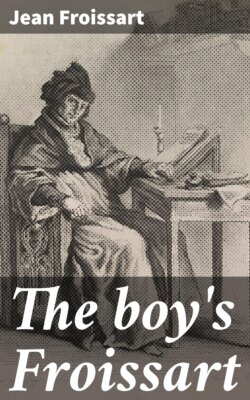Читать книгу The boy's Froissart - Froissart Jean - Страница 23
На сайте Литреса книга снята с продажи.
CHAPTER XIX.
ОглавлениеTable of Contents
King Edward is advised by his Council to make War against King Philip of France. He effects great Alliances in Germany, and is made Vicar of the Empire.
The Lord Robert d’Artois[4] was in England very near the king’s person, whom he was continually advising to make war upon the King of France, for wrongfully withholding his inheritance. The king saw clearly that it was impossible for him, and all the force he could bring from his own country, to subdue such a great kingdom as that of France, if he did not obtain powerful friends and assistance in the empire, and in other parts, by means of his money.
The King of England, when the winter was over, embarked, accompanied by many earls, barons, and knights, and came to the city of Antwerp, which at that time was held for the Duke of Brabant. He sent to the Duke of Brabant, his cousin, his brother-in-law the Duke of Gueldres, to the Marquis of Juliers, the Lord John of Hainault, and to all those from whom he expected support and assistance, that he should be happy to have some conversation with them.
When all the lords of the empire were assembled in the city of Halle, they had long deliberations together, and said to the King of England, “Dear sir, there is an ordinance of a very old date, sealed, that no king of France should take and keep possession of any thing that belongs to the empire. Now, King Philip has gotten possession of the castles of Crevecœur in Cambresis, and of Arleux in Artois, as well as the city of Cambray; for which the emperor has good grounds to challenge him through us,—if you will have the goodness to obtain his consent, in order to save our honor.” The King of England replied that he would cheerfully conform himself to their advice.
It was then determined that the Marquis of Juliers should go to the emperor, and with him knights and counsellors from the king, and some from the Duke of Gueldres; but the Duke of Brabant would not send any: he lent, however, his castle of Louvain to the king for his residence.
The Marquis of Juliers and his company returned from the emperor about All Saints’ Day; and, when he sent to inform the king of this, he congratulated him on the good success of his mission. The king wrote him for answer that he should come to him on the feast of St. Martin, and demanded of the Duke of Brabant to name the place where he wished this conference to be holden; who replied, at Arques, near to his own country. Upon this the king gave notice of it, that all his allies might be there.
The town-hall of Arques was hung with rich and fine cloths, like to the presence-chamber of the king. His Majesty was seated five feet higher than the rest of the company, and had on his head a rich crown of gold. The letters from the emperor to the king were publicly read, by which the King of England was constituted and established his vicar and lieutenant, and full powers granted to him to do all the acts of law and justice to every one, in his name, and also to coin money in gold and silver.
On this occasion an ancient statute was renewed and confirmed, which had been made in former times at the court of the emperor. It directed that any one meaning to hurt or annoy another should send him a sufficient defiance three days before he committed any hostile act; and that whoever should act otherwise should be degraded as an evil-doer. When all this was completed, the lords took their leave, and gave each other their mutual promises to be fully equipped, without delay, three weeks after the feast of St. John, to sit down before the city of Cambray; which of right belonged to the emperor, but had turned to the French.
